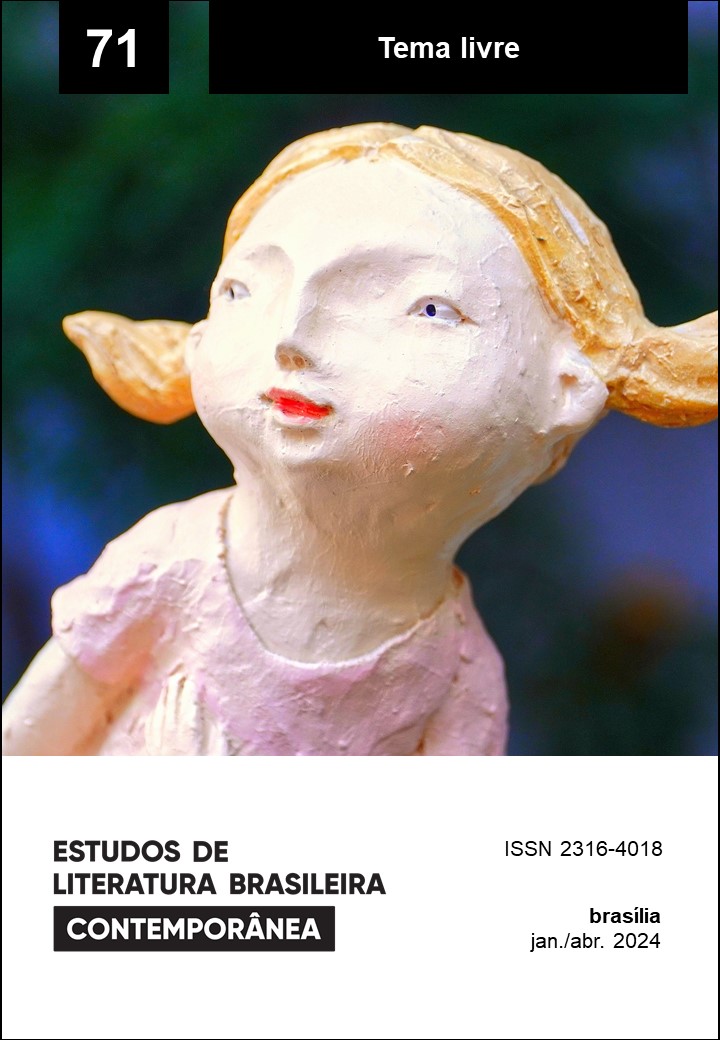Coloniality of power in Save the Fire, by Itamar Vieira Junior
DOI:
https://doi.org/10.1590/2316-40187105Keywords:
poverty; colonialism; coloniality of power; intersectionalityAbstract
Save the fire, by Itamar Vieira Junior (2023), is a narrative that focuses on extreme poverty, leading to exclusion and does not foreshadow salvation. Set in northeastern Brazil, it recovers the stereotype of northeasterners as synonymous with poverty, as well as the social inequality that has plagued the country since colonial times. It refers to the excesses of the Catholic church which, through religiosity, not only manipulates but also exploits the underprivileged population. The narrative takes place in contemporary times and, therefore, corroborates Aníbal Quijano’s (2014) statement that colonialism left traces wherever it went, because, despite no longer existing, the coloniality of power is still present, mainly among the most vulnerable sections of the population. The brutality of capitalism together with neoliberalism corrodes the existence of the poorest, forcing constant migration as a means of escaping poverty. Furthermore, the assumptions of race, ethnicity, and gender also present themselves, demonstrating the intersectionality always present in these layers of the population. Using these assumptions as guiding threads to analyze the narrative, it was essential to resort to the studies of Gayatri Spivak (2010), Aníbal Quijano (2014), María Lugones (2014), Walter D. Mignolo (2017), Isildinha Baptista Nogueira (2021), Patricia Hill Collins e Sirma Bilge (2021), Rita Segato (2021), among others.
Downloads
References
COLLINS, Patricia Hill; BILGE, Sirma (2021). Interseccionalidade Tradução: Rane Souza. São Paulo: Boitempo.
CRENSHAW, Kimberle (1991). Mapping the Margins: Intersectionality, Identity Politics, and Violence against Women of Color. Stanford Law Review, v. 43, n. 6, p. 1241-1299. Disponível em: https://blogs.law.columbia.edu/critique1313/files/2020/02/1229039.pdf Acesso em: 10 out. 2023.
» https://blogs.law.columbia.edu/critique1313/files/2020/02/1229039.pdf
HALL, Stuart (2006). A identidade cultural na pós-modernidade Tradução: Tomaz Tadeu da Silva e Guacira Lopes Louro. Rio de Janeiro: DP&A.
LUGONES, María (2014). Rumo a um feminismo descolonial. Revista Estudos Feministas, Florianópolis, v. 22, n. 3, p. 935-952. https://doi.org/10.1590/%25x
» https://doi.org/10.1590/%25x
MEMMI, Albert (1977). Retrato do colonizado precedido pelo retrato do colonizador Tradução de Roland Corbisier e Mariza Pinto Coelho. Rio e Janeiro: Paz e Terra.
MIGNOLO, Walter D. (2017). Colonialidade: o lado mais escuro da modernidade. Tradução: Marco Oliveira. Revista Brasileira de Ciências Sociais, v. 32, n. 94, e329402. https://doi.org/10.17666/329402/2017
» https://doi.org/10.17666/329402/2017
NOGUEIRA, Isildinha Baptista (2021). A cor do inconsciente: significações do corpo negro. São Paulo: Perspectiva.
POTIGNAT, Phillipi; STREIF-FENART, Jocelyne (1998). Teoria da etnicidade Seguido por Grupos Étnicos e suas Fronteiras. Tradução: Elcio Fernandes. São Paulo: Editora da Unesp.
QUIJANO, Aníbal (2014). Colonialidad del poder y clasificación social. In: Cuestiones y horizontes: de la dependencia histórico-estructural a la colonialidad/descolonialidad del poder. Buenos Aires: Clacso. p. 285-326. Disponível em: https://biblioteca.clacso.edu.ar/clacso/se/20140506032333/eje1-7.pdf Acesso em: 3 maio 2021.
» https://biblioteca.clacso.edu.ar/clacso/se/20140506032333/eje1-7.pdf
SEGATO, Rita (2021). Crítica da colonialidades em oito ensaios: e uma antropologia por demanda. Tradução: Danielli Jatobá e Danú Gontijo. Rio de Janeiro: Bazar do Tempo.
SPIVAK, Gayatri C. (2010). Pode o subalterno falar? Tradução: Sandra Regina Goulart Almeida et al. Belo Horizonte: Editora UFMG.
VIEIRA JUNIOR, Itamar (2019). Torto arado São Paulo: Todavia.
VIEIRA JUNIOR, Itamar (2023). Salvar o fogo São Paulo: Todavia.
Downloads
Published
How to Cite
Issue
Section
License

This work is licensed under a Creative Commons Attribution 4.0 International License.
Authors who publish in this journal agree to the following terms:
a) The authors maintain the copyright and grant the journal the right of first publication, the work being simultaneously licensed under the Creative Commons Attribution License-Non Commercial 4.0 which allows the sharing of the work with acknowledgment of the authorship of the work and publication this journal.
b) Authors are authorized to enter into additional contracts separately, for non-exclusive distribution of the version of the work published in this journal (eg publish in institutional repository or as a book chapter), with authorship recognition and publication in this journal.
c) Authors are allowed and encouraged to publish and distribute their work online (eg in institutional repositories or on their personal page) after the editorial process, as this can generate productive changes, as well as increase the impact and citation of published work (See The Effect of Free Access).
d) The authors of the approved works authorize the magazine to, after publication, transfer its content for reproduction in content crawlers, virtual libraries and the like.
e) The authors assume that the texts submitted to the publication are of their original creation, being fully responsible for their content in the event of possible opposition by third parties.


